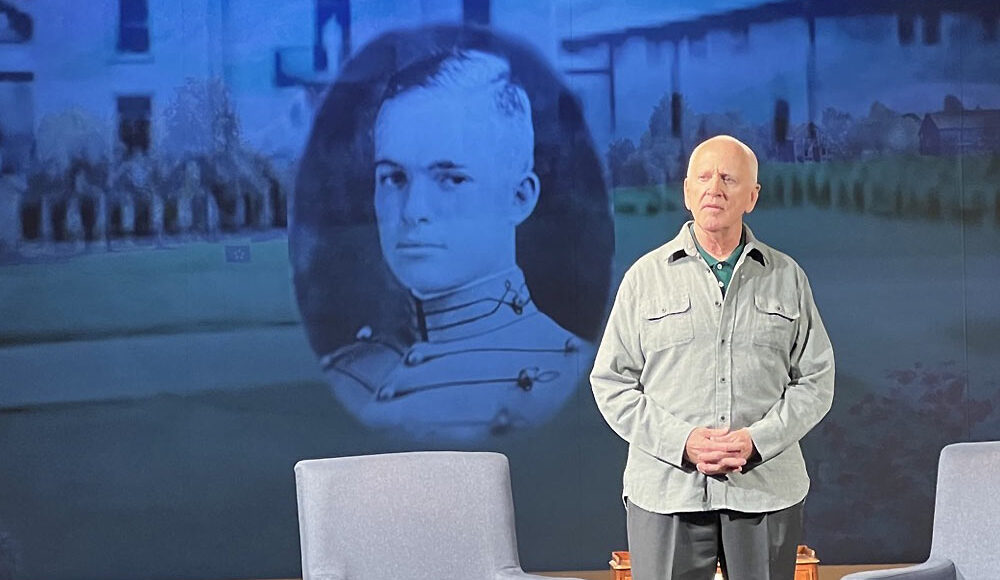By Ernest Kearney — In dramatizing the life of Dwight D. Eisenhower, you are faced with two wildly, out of balance acts. The first act is Eisenhower the military man, his service in the Philippines, Douglas MacArthur, the invasions of North Africa and Italy, his affair with Kay Summersby, and finally his overall command of the invasion of Nazi Occupied Europe.
The protagonist of Act Two is President Eisenhower. And the drama of the Oval Office pales beside that of the beaches of D-Day.
In Eisenhower: This Piece of Ground, Playwright Richard Hellesen chose to confine himself, primarily, to the second act of Eisenhower’s life and shortly before the final curtain closed on it.
Hellesen opens his play in 1962, with the seventy-two-year-old Eisenhower, out of office and on the sun porch of the working farm in Gettysburg, Pennsylvania; where he and his wife Mamie would spend the remaining five years of his life.
Hellesen employs a theatrical device which others have found serviceable, that of the protagonist dictating his memoirs into a recording device.
Eisenhower harkens back to his early life, the third of David and Ida Eisenhower’s seven sons. In his telling of the hardworking family’s hardscrabble days in Abilene, Kansas and young Eisenhower’s closeness to his devoutly religious mother, the playwright lays out the solid foundation on which the man will rise.
Hellesen touches some of the milestones of Eisenhower’s presidency; his knitting together the nation with 41,000 miles of new roadways thru his sponsorship of the Federal Aid Highway Act of 1956, fuelling economic prosperity by balancing the budget three times, and ending the Korean conflict, which Eisenhower regarded as his greatest achievement.
Passed over are the lesser successes of Ike’s presidency, such as his administration’s vacillation towards the civil rights movement and its unwillingness to confront the threat posed by Republican Senator Joe McCarthy’s toxic red-hunting campaign.
Other watersheds of Eisenhower’s presidency are not even touched on; His battle to install Charles Bohlen as U.S. ambassador to Russia over the opposition of McCarthy and the conservatives of his own party and the Suez Crisis of 1956 when Eisenhower imposed economic sanctions against Britain and France for conspiring with Israel to seize the Suez Canal after being nationalized by Egypt’s Gamal Nasser.
Hellesen may be forgiven if his work is history-lite, because his foremost concern appears to be bringing Eisenhower’s character to the forefront. In achieving this, the production proves far more successful than the play and, for that, credit must go to John Rubinstein’s portrayal of Eisenhower. Good actors give voice to a character, great actors give them a soul.

For those of us who lived through the Eisenhower years, the Tony award-winning Rubinstein blurs the line between performance and memory, while for younger audiences the sense of watching will seem transmuted to witnessing as both audiences are beguiled by the reality of Rubinstein’s devising.
Director Peter Ellenstein has skillfully crafted the environment to facilitate Rubinstein in this metamorphosis, with a set by Pierre Vuilleumier of a Pennsylvania vista which provides a screen for the projections of Joe Huppert.
Using a procession of ethereal images rising and fading as memories do, Ellenstein conjures a chimerical channel between the audience and his actor, a bridge that Rubinstein expertly exploits.
No, Eisenhower: This Piece of Ground is not a history lesson, it is a time machine.
___________________________________
(NOTE: John Rubinstein as Eisenhower in Production Stills by Pierre Lumiere)
* * *
Eisenhower: This Piece of Ground
Currently on stage at
The Hudson MainStage Theatre
6539 Santa Monica Blvd.
Los Angeles, CA. 90036
From:
December 9th – 18th, 2022.
Performances will be Friday & Saturday 8pm and Sunday 2pm.
Two additional shows: Thursday Dec 15 at 8pm & Saturday Dec 17 at 3pm
* * *
Ticket pricing: $40 | Preview: $25 | Students/Seniors/Military Veterans: $30 |
Online tickets. www.onstage411.com/eisenhower
OR
www.newlarep.org
* * *




